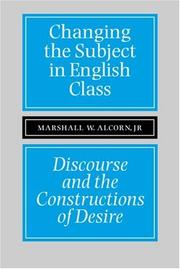| Listing 1 - 3 of 3 |
Sort by
|
Book
ISBN: 1483327876 1452249075 Year: 1997 Publisher: Thousand Oaks : SAGE Publications,
Abstract | Keywords | Export | Availability | Bookmark
 Loading...
Loading...Choose an application
- Reference Manager
- EndNote
- RefWorks (Direct export to RefWorks)
Scholarly yet provocatively written, Academic Outlaws presents a discussion of how life in the academic world is experienced by gay men and lesbian women. Using a narrative style that mixes autobiography, case study data and fiction, William G Tierney provides timely insight into the challenges gays and lesbians face in higher education and proposes an alternative process for redefining long-established cultural norms.
Culture -- Study and teaching (Higher). --- Gay and lesbian studies. --- Gay culture. --- Gay teachers. --- Gays -- Identity. --- Queer theory.

ISBN: 9058670295 9789058670298 Year: 2000 Volume: 16. Publisher: Leuven : Leuven university press,
Abstract | Keywords | Export | Availability | Bookmark
 Loading...
Loading...Choose an application
- Reference Manager
- EndNote
- RefWorks (Direct export to RefWorks)
Sociology of culture --- Letterkunde --- Littérature --- Vlasselaers, Joris --- Culture --- Study and teaching. --- Etude et enseignement --- Vlasselaers, J. --- Vlasselaers, Joris, --- Popular culture --- Literature --- Study and teaching (Higher) --- Vlasselaers, J --- 82:3 --- 008 --- Academic collection --- #SBIB:309H040 --- #SBIB:316.7C120 --- #SBIB:003.AANKOOP --- -Literature --- -Popular culture --- Culture, Popular --- Mass culture --- Pop culture --- Popular arts --- Communication --- Intellectual life --- Mass society --- Recreation --- Belles-lettres --- Western literature (Western countries) --- World literature --- Philology --- Authors --- Authorship --- Cultural sociology --- Civilization --- Literatuur en maatschappijwetenschappen --- Beschaving. Cultuur. Vooruitgang --- Populaire cultuur algemeen --- Cultuursociologie: algemene en theoretische werken --- Social aspects --- 008 Beschaving. Cultuur. Vooruitgang --- 82:3 Literatuur en maatschappijwetenschappen --- Culture - Study and teaching (Higher) --- Popular culture - Study and teaching (Higher) --- Literature - Study and teaching (Higher) --- Vlasselaers, J - (Joris), - 1935 --- -Culture --- -Sociology of culture

ISBN: 1429417412 9781429417419 080932427X 9780809324279 0809324202 9780809324200 Year: 2002 Publisher: [Place of publication not identified] Southern Illinois University Press
Abstract | Keywords | Export | Availability | Bookmark
 Loading...
Loading...Choose an application
- Reference Manager
- EndNote
- RefWorks (Direct export to RefWorks)
Drawing on the theoretical work of Jacques Lacan, Marshall W. Alcorn Jr. formulates a systematic explanation of the function and value of desire in writing instruction. Alcorn argues that in changing the subject matter of writing instruction in order to change student opinions, composition instructors have come to adopt an insufficiently complex understanding of subjectivity. This oversimplification hinders attempts to foster cultural change. Alcorn proposes an alternative mode of instruction that makes effective use of students' knowledge and desire. The resulting freedom in expression - personal as well as political - engenders the recognition, circulation, and elaboration of desire necessary for both human communication and effective politics. Responding to James Berlin's reconception of praxis in the classroom, Theresa Ebert's espousal of disciplined instructions, and Lester Faigley's introduction of a postmodern theory of subjectivity, Alcorn follows both Lacan and Slavoj Žižek in insisting desire be given free voice and serious recognition. In composition as in politics, desire is the ground of agency. Competing expressions of desire should generate a dialectic in social-epistemic discourse that encourages enlightenment over cynicism and social development over authoritarian demands. With clarity and personal voice, Alcorn explains how discourse is rooted in primitive psychological functions of desire and responds to complex cultural needs. In its theoretical scope this book describes a new pedagogy that links thought to emotion and the personal to the social.
English language --- English philology --- Language and culture --- Report writing --- Culture --- Rhetoric and psychology --- English --- Languages & Literatures --- English Language --- Psychology and rhetoric --- Rhetoric --- Literature --- Psychology --- Cultural sociology --- Sociology of culture --- Civilization --- Popular culture --- Culture and language --- Germanic languages --- Study and teaching --- Psychological aspects --- Political aspects --- Study and teaching (Higher) --- History --- Discourse analysis --- Social aspects --- English language - Rhetoric - Study and teaching - United States --- English language - Rhetoric - Study and teaching - Psychological aspects --- English language - Rhetoric - Study and teaching - Political aspects --- English philology - Study and teaching (Higher) - United States --- Language and culture - United States - History - 20th century --- Report writing - Study and teaching (Higher) - United States --- Culture - Study and teaching (Higher) - United States --- English language - Discourse analysis
| Listing 1 - 3 of 3 |
Sort by
|

 Search
Search Feedback
Feedback About
About Help
Help News
News